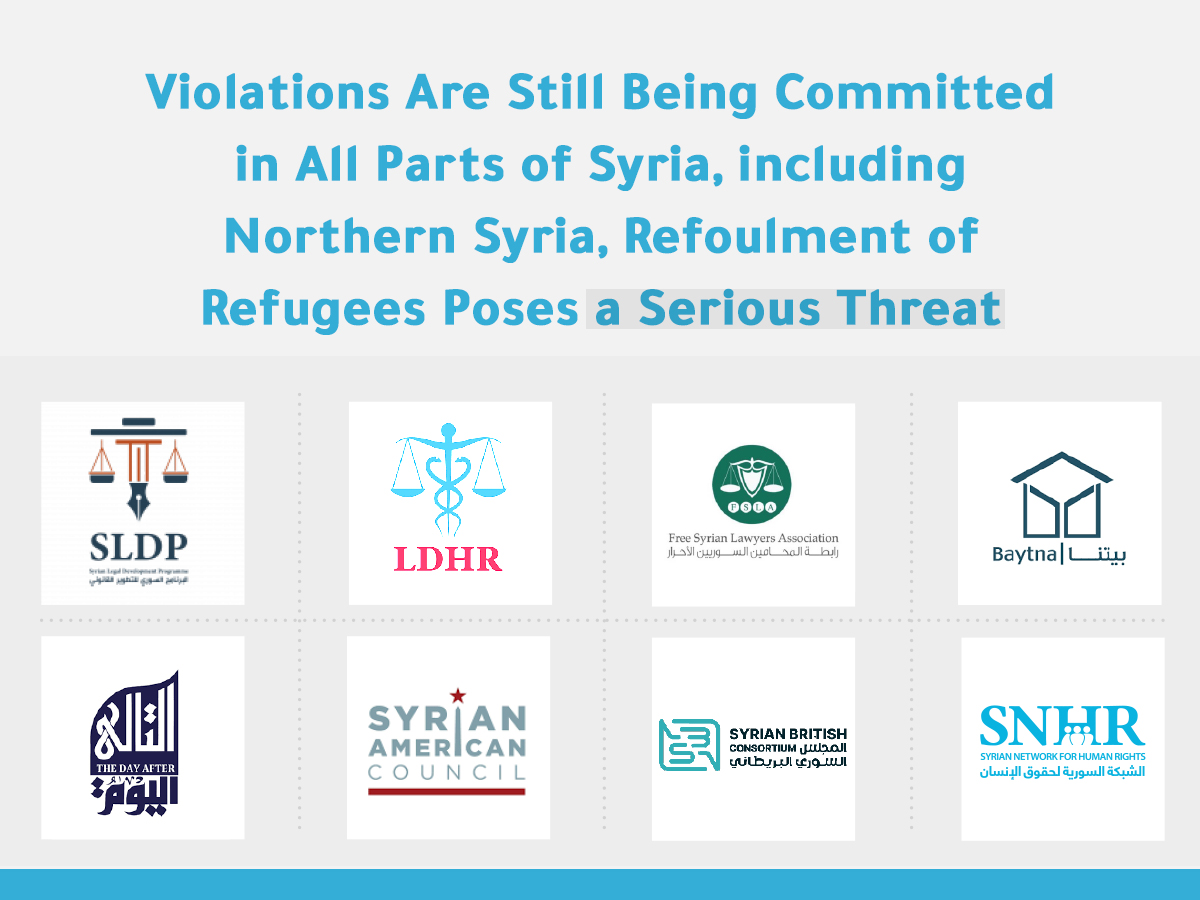Turkish Authorities Must Respect Their Obligations Under Customary International Law Which Strictly Prohibits Refoulment
Read the full Statement: العربية – English
We, the undersigned Syrian civil society organizations, wish to express our profound concern at the Turkish government’s recent decision to forcibly repatriate Syrian refugees to northwestern Syria. Such a decision constitutes a violation of the Principle of Non-Refoulment established in international law and enshrined in the 1951 Geneva Convention and its 1967 Protocol. Those instruments are widely considered and accepted as forming the fundamental foundation for protecting the rights of asylum seekers and refugees. The Non-Refoulment Principle is a customary principle that is binding to all states, including those states that have not ratified the 1951 Geneva Convention.
This principle prohibits the banishment, return, or deportation of asylum seekers to areas where their lives, freedom, or safety, would be in probable danger. As such, the region of northwestern Syria, to which Syrian refugees are being returned by Türkiye and which is under the control of Hay’at Tahrir al-Sham (HTS) and the Syrian National Army (SNA), are still unsafe, with new and grave violations of human rights recorded on a daily basis.
The systematic and widespread violations by the parties to the conflict in Syria, primarily the Syrian regime and its two allies Iran and Russian, which have been the parties responsible for the overwhelming majority of violations, some of which constitute crimes against humanity, continue, most evidently in the form of the forced displacement of approximately 14 million Syrian citizens who are now either internally displaced persons (IDPs) or refugees. It is only because of the unconscionable oppression and persecution that have been taking place since March 2011 that Syrians have found no recourse but to flee such harrowing reality, and are now seen as eligible to request asylum in the eyes of international law.
Due to many factors, including the proximity of Syria and Türkiye and the long border between the two countries, millions of Syrians sought asylum in Türkiye. The EU-Turkish refugee agreement of 2016 meant that hundreds of thousands of refugees were unable to cross into EU states that would have given them better rights and protection, including permanent residency and the right to citizenship. In light of this understanding, Türkiye is now hosting the highest numbers of Syrians, for which it receives massive funds from the EU in return. It must be noted that while Türkiye did give Syrian refugees some basic rights, the state of many rights is still uncertain and unclear. According to the UN Refugee Agency (UNHCR), 3,329,516 Syrian refugees are resident in Türkiye as of July 13, 2023.
It is not uncommon, unfortunately, for governments to blame refugees, who are seeking asylum simply for survival, for economic and social challenges that have been escalating since before those refugees even came to the state. However, a vulnerable and voiceless group like refugees makes for an attractive scapegoat since they have no platform or outlet through which to defend themselves. Because of this, governments and opposition parties commonly lay the blame for problems affecting their countries at refugees’ feet, making false statements and promises in elections, such as claiming that deporting hundreds of thousands of refugees would improve the economic situation of the country’s citizens. This was the case in Türkiye‘s most recent general elections in May this year, with the fallout of these elections still being felt, most palpably in June and July, with the crackdown on Syrian refugees intensifying in many Turkish provinces, most notably Istanbul. During this period, hundreds of Syrian refugees have been detained and subsequently deported.
